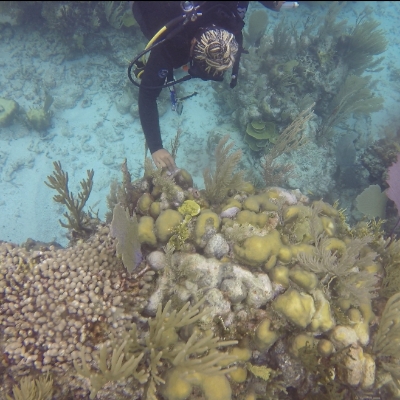SCTLD Treatments
Leadership
Research Team
Perry Institute of Marine Science Coral Disease Program
Project Overview
Stony Coral Tissue Loss Disease (SCTLD) was first observed in The Bahamas in late 2019 and early 2020 and has since spread to at least 7 different islands by May 2022. This disease poses the greatest short-term threat to corals in The Bahamas due to its high mortality rate, rapid spread, wide range of species of reef building corals affected (25 species documents in the Bahamas to date), and yet unidentified pathogen(s) causing the disease. Nevertheless, scientists have found ways to minimize spread of the disease, save infected coral colonies before they suffer complete mortality to prevent loss of species, and have developed genetic rescue strategies as a last resort effort to provide the brood stock for reef recovery following the devastating effects of the pandemic. This project is focused on the identification of areas with SCTLD, their assessment, and use of antibiotics to save priority coral species and colonies at priority sites, following a strategy developed by the Bahamas Stony Coral Tissue Loss Disease Task Force in 2020.
Duration of Project
Ongoing since 2020
Expedition Summary
On this expedition, the PIMS team, led by Dr. Valeria Pizzaro, worked and lived aboard DISCOVERY Vessel Andromeda off of Abaco Island in The Bahamas for four days and completed over 10 individual coral disease treatment dives. Here, they were targeting a large patch reef with applications of topical amoxicillin antibiotic treatments aimed at preventing the spread of Stony Coral Tissue Loss Disease (SCTLD). This patch reef is particularly important for the study of coral disease as well as for the livelihoods of local Bahamians, making regular research trips to this location vital for further understanding of SCTLD in global coral ecosystems. On each dive, team members visually assessed coral colonies for signs of SCTLD before applying topical antibiotics to the borders of the diseased tissue and recording the conditions and location of the treated colony. Additionally, through digital assessments created with the help of photo-mapping drone technology, PIMS coral disease team can create a long-term database of reef health and disease advancement or lack thereof down to the individual polyp level. Assessments and treatments of SCTLD on large coral reefs such as this one off of Abaco would be otherwise impossible without the type of vessel support provided by SeaKeepers and S/Y Andromeda that allows researchers to have such easy access to these remote areas and resources like an air compressor for refilling SCUBA tanks. Overall, the PIMS coral disease team spent over 11 hours in the water and treated an estimated 400+ coral colonies for SCTLD. This was an extremely successful trip for PIMS, SeaKeepers, and DISCOVERY Yacht Andromeda, and we look forward to working with this team and crew again in the future to monitor the advancement of SCTLD in Bahamian reef communities.
Application
All data collected will be strictly shared with the Department of Environmental Planning & Protection in accordance with the research permitting process. Long term, this will help protect the coral reefs of the Bahamas, and hopefully, coral species and reefs in other regions using similar methods.
Location
Abaco, The Bahamas

